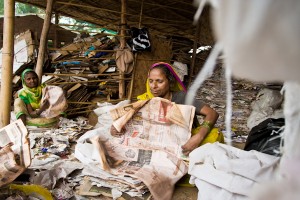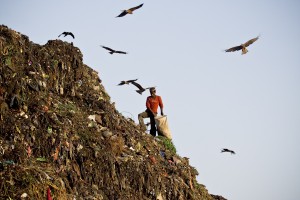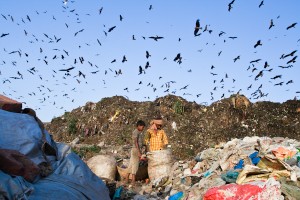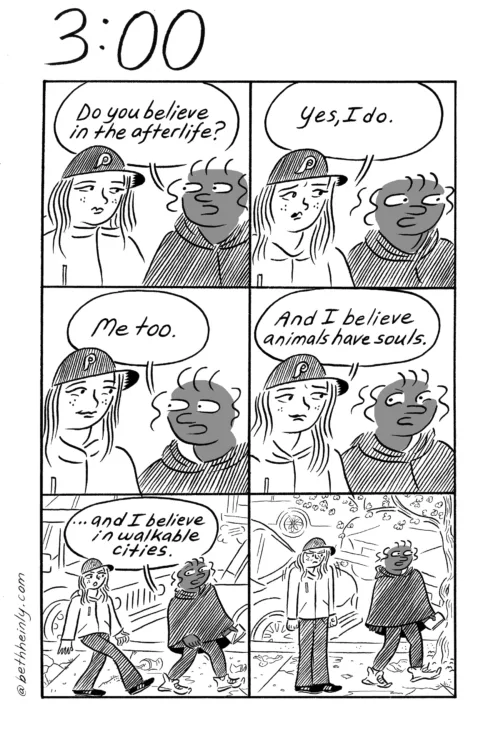Enrico Fabian is a German-born, Delhi-based photographer whose work is on display at the India Habitat Center. Fabian spent three months in 2008 working alongside the NGO Chintan documenting the daily life of the Kabari, a general term used for people in India who collect and sell recyclable materials. Fabian’s show consists of about two dozen 44 inch x 32 inch framed photographs, each with an explanatory printed caption underneath. You walk clockwise around the space, each photograph leading you into the next, like a photoessay. It is an eye-opening show on the topic of waste recycling and how it ties in with poverty in India.
 Newspapers sell for 5 rupees per kilo, or 4 cents per pound. Photo copyright Enrico Fabian.
Newspapers sell for 5 rupees per kilo, or 4 cents per pound. Photo copyright Enrico Fabian.
We constantly see people throwing trash on the street in Delhi, but despite few to no trash cans, and the large population (around 17 million people, Philly’s population is around 1.5 million) there is less trash in Delhi than I anticipated. Businesses seem to sweep their stores periodically through the day, and every night we see businesses burning a small pile of trash in front of their stores.
Because India is a rapidly developing country, I did not expect recycling to exist. It does, but it is not municipal, and it doesn’t have the same good-for-its-own-sake impetus like in America. It’s done to make money by low-level Kabari who sift through dirt, food and shit to collect plastic bottles, paper, glass, and metal. According to Fabian, there are about 150,000 Kabaris total in Delhi who recycle about 59% of the city’s waste to support themselves and their families.
Over 95% of homes in Delhi have no formal system of garbage removal. A typical day for a Kabari includes picking up trash door-to-door in a neighborhood, and separating recyclables that can be sold to a trash trader. We occasionally see men on bikes with refrigerator-sized blocks of precycled trash on their backs, navigating a street in Delhi on their way to a trash trader.
Kabari also collect and sell plastic bottles. This is very profitable in touristy areas because most westerners like us can’t/don’t drink tap water. We each go through about three bottles a day. According to Fabian, this soft plastic is sold for 9-12 rupees, or 8-11 cents per pound. More money can be made from plastic bottles in the summer rather than the winter, when people tend to drink more. The bottles are brought to a processing plant, shredded up, washed, dried in the sun, then brought to a factory where the plastic is melted down to make new items such as clothes and toys.
 Man sorting plastic bottles. Photo copyright Enrico Fabian.
Man sorting plastic bottles. Photo copyright Enrico Fabian.
A particularly interesting aspect of trash recycling in India is e-waste (electronic waste). Often, computers and appliances are cannibalized for their parts to fix other electronics, providing some hazard for the recyclers who are exposed to CRTs and radioactive tubes. 146,000 tons of electronic waste is recycled informally in India each year.
 Man on a “cliff” in a landfill. Photo copyright Enrico Fabian.
Man on a “cliff” in a landfill. Photo copyright Enrico Fabian.
Landfill trash-pickers collect what street-level trash-pickers miss. The occupational hazards of working in landfills is a serious issue. Besides the environmental danger, items such as hypodermic needles are scavenged, risking exposure to AIDS and Hepatitis (the number of people with HIV/AIDS in India is 2.4 million). Oftentimes Kabari have to bribe city/gov’t workers to gain entry to the landfills. Ghazipur, one of the largest landfills in Delhi, is one of the many landfills that is reaching capacity.
 Sorting trash in a landfill. Photo copyright Enrico Fabian.
Sorting trash in a landfill. Photo copyright Enrico Fabian.
Over a million people in India earn their livelihood through waste recycling. On top of a low standard of living, they now face joblessness with India’s new business-model approach to waste management — replacing the preexisting informal Kabari system with a model from developed countries. One of Chintan’s goals is to provide Kabari with legal provisions, such as providing access to education for children, who are unfortunately more useful to their families as trashpickers. Children often receive central-government incentives like bookbags and pencil cases, then sell them and return to scavenging.
Fabian’s show is an eye-opener on how Delhi (and India) deals with its trash — the culture and economics around trash picking. Immediately after we left Fabian’s show, we saw what looked like a huge bag ambling down the road. As we passed, we saw the man carrying it. He was old, barefoot, dirty, and hunched under the bag’s weight. A few minutes later we saw some children sitting in a pile of trash, separating the plastic bottles.
Urban recycling in India, we learned, is inextricably tied in with poverty. I’m currently reading “Maximum City” by Suketu Mehta while we travel. He writes, “One slogan that’s been particularly absent from [2005 elections] is GARIBI HATAO. ‘Remove Poverty.’ It’s as if there’s a tacit acknowledgment on all sides that the poverty is insurmountable…” Though this quote refers to Mumbai, I find that it also applies to the overall troubling image of poverty in India.
Enrico Fabian can be contacted at mail@enrico-fabian.com.










